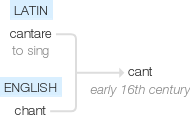Cant
early 16th century: probably from Latin cantare ‘to sing’ (see chant). The early meaning was ‘musical sound, singing’; in the mid 17th century this gave rise to the senses ‘whining manner of speaking’ and ‘form of words repeated mechanically in such a manner’ (for example a beggar's plea), hence ‘jargon’ (of beggars and other such groups).
wiktionary
From Latin cantō probably via Old Northern French canter(“sing, tell”) [1] [2]. Doublet of chant.
From Middle English cant(“edge, brink”), from Middle Dutch cant(“point, side, edge”) (Modern Dutch kant(“side, edge”)), ultimately of Celtic or Latin origin. Related to Medieval Latin cantus(“corner, side”), from Latin canthus.
Unknown, but compare Provençal cantel(“corner, piece”) or Old Northern French cantel(“piece broken off”). [3] The verb is attested from the 15th century, [4] and the noun from the 16th. [3]
From Middle English cant, kaunt, presumably from Middle Low German*kant. Compare Dutch kant(“neat, clever”). Attested from the 13th or 14th century. [5]
etymonline
cant (n.1)
"pretentious or insincere talk, ostentatious conventionality in speech," 1709. The earliest use is as a slang word for "the whining speech of beggars asking for alms" (1640s), from the verb in this sense (1560s), from Old North French canter (Old French chanter) "to sing, chant," from Latin cantare, frequentative of canere "to sing" (from PIE root *kan- "to sing").
Century Dictionary notes the ecclesiastical use of cantus in Medieval Latin, and writes, "The word cant may thus have become associated with beggars; but there may have been also an allusion to a perfunctory performance of divine service and hence a hypocritical use of religious phrases." The sense in English expanded after 1680 to mean "the jargon of criminals and vagabonds," and from thence the word was applied contemptuously by any sect or school to the phraseology of its rival.
... Slang is universal, whilst Cant is restricted in usage to certain classes of the community: thieves, vagrom men, and — well, their associates. ... Slang boasts a quasi-respectability denied to Cant, though Cant is frequently more enduring, its use continuing without variation of meaning for many generations. [John S. Farmer, Forewords to "Musa Pedestris," 1896]
cant (n.2)
"slope, slant," late 14c., first in Scottish writing and apparently meaning "edge, brink," a word of uncertain origin. "words identical in form and corresponding in sense are found in many languages, Teutonic, Slavonic, Romanic, Celtic" [OED]. It was rare in English before c. 1600. Meaning "slope, slanting or tilting position" is from 1847.
Perhaps via Old North French cant "corner" (itself perhaps via Middle Low German kante or Middle Dutch kant), from Vulgar Latin *canthus, from Latin cantus "iron tire of a wheel," which is possibly from a Celtic word meaning "rim of wheel, edge, brim" (compare Welsh cant "bordering of a circle, tire, edge," Breton cant "circle"). The ultimate connections of these are uncertain. Greek kanthos "corner of the eye," and Russian kutu "corner" sometimes are suggested, but there are difficulties (see Beekes).
cant (v.1)
1560s, "to speak in a whining voice," from cant (n.1). From c. 1600 as "to speak in the jargon of thieves and vagabonds;" 1670s as "talk hypocritically in pompous phraseology." Related: Canted; canting.
cant (v.2)
1540s, "give a cant to an edge," from cant (n.2). From 1741 as "put in an oblique position;" in sailing, "move obliquely," 1784. Related: Canted; canting.
